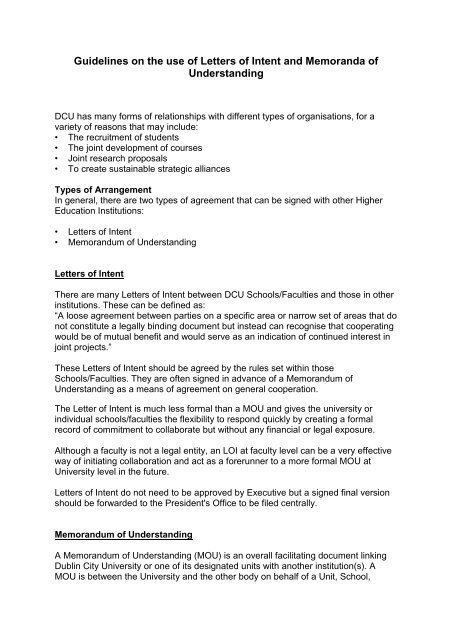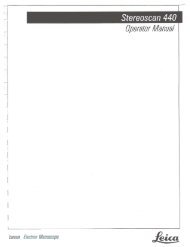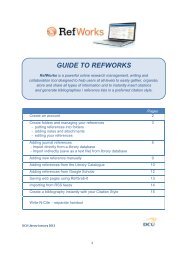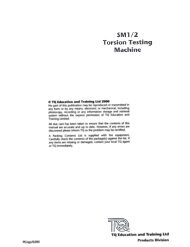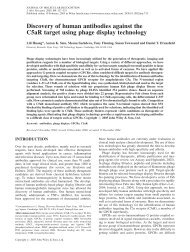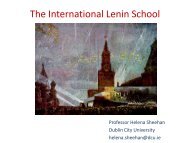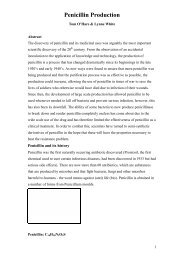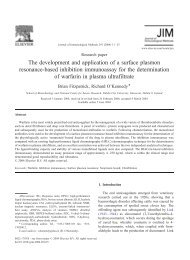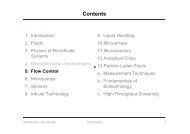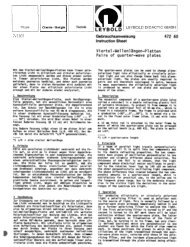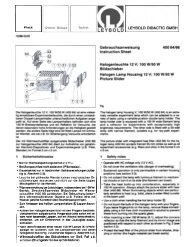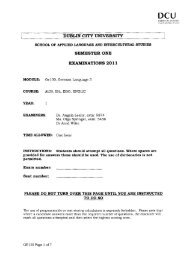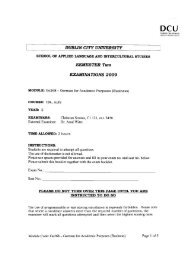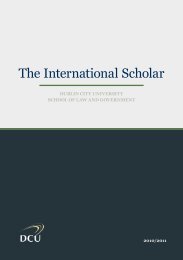Guidelines on the use of Letters of Intent and ... - Dublin City University
Guidelines on the use of Letters of Intent and ... - Dublin City University
Guidelines on the use of Letters of Intent and ... - Dublin City University
You also want an ePaper? Increase the reach of your titles
YUMPU automatically turns print PDFs into web optimized ePapers that Google loves.
<str<strong>on</strong>g>Guidelines</str<strong>on</strong>g> <strong>on</strong> <strong>the</strong> <strong>use</strong> <strong>of</strong> <strong>Letters</strong> <strong>of</strong> <strong>Intent</strong> <strong>and</strong> Memor<strong>and</strong>a <strong>of</strong><br />
Underst<strong>and</strong>ing<br />
DCU has many forms <strong>of</strong> relati<strong>on</strong>ships with different types <strong>of</strong> organisati<strong>on</strong>s, for a<br />
variety <strong>of</strong> reas<strong>on</strong>s that may include:<br />
• The recruitment <strong>of</strong> students<br />
• The joint development <strong>of</strong> courses<br />
• Joint research proposals<br />
• To create sustainable strategic alliances<br />
Types <strong>of</strong> Arrangement<br />
In general, <strong>the</strong>re are two types <strong>of</strong> agreement that can be signed with o<strong>the</strong>r Higher<br />
Educati<strong>on</strong> Instituti<strong>on</strong>s:<br />
• <strong>Letters</strong> <strong>of</strong> <strong>Intent</strong><br />
• Memor<strong>and</strong>um <strong>of</strong> Underst<strong>and</strong>ing<br />
<strong>Letters</strong> <strong>of</strong> <strong>Intent</strong><br />
There are many <strong>Letters</strong> <strong>of</strong> <strong>Intent</strong> between DCU Schools/Faculties <strong>and</strong> those in o<strong>the</strong>r<br />
instituti<strong>on</strong>s. These can be defined as:<br />
“A loose agreement between parties <strong>on</strong> a specific area or narrow set <strong>of</strong> areas that do<br />
not c<strong>on</strong>stitute a legally binding document but instead can recognise that cooperating<br />
would be <strong>of</strong> mutual benefit <strong>and</strong> would serve as an indicati<strong>on</strong> <strong>of</strong> c<strong>on</strong>tinued interest in<br />
joint projects.”<br />
These <strong>Letters</strong> <strong>of</strong> <strong>Intent</strong> should be agreed by <strong>the</strong> rules set within those<br />
Schools/Faculties. They are <strong>of</strong>ten signed in advance <strong>of</strong> a Memor<strong>and</strong>um <strong>of</strong><br />
Underst<strong>and</strong>ing as a means <strong>of</strong> agreement <strong>on</strong> general cooperati<strong>on</strong>.<br />
The Letter <strong>of</strong> <strong>Intent</strong> is much less formal than a MOU <strong>and</strong> gives <strong>the</strong> university or<br />
individual schools/faculties <strong>the</strong> flexibility to resp<strong>on</strong>d quickly by creating a formal<br />
record <strong>of</strong> commitment to collaborate but without any financial or legal exposure.<br />
Although a faculty is not a legal entity, an LOI at faculty level can be a very effective<br />
way <strong>of</strong> initiating collaborati<strong>on</strong> <strong>and</strong> act as a forerunner to a more formal MOU at<br />
<strong>University</strong> level in <strong>the</strong> future.<br />
<strong>Letters</strong> <strong>of</strong> <strong>Intent</strong> do not need to be approved by Executive but a signed final versi<strong>on</strong><br />
should be forwarded to <strong>the</strong> President's Office to be filed centrally.<br />
Memor<strong>and</strong>um <strong>of</strong> Underst<strong>and</strong>ing<br />
A Memor<strong>and</strong>um <strong>of</strong> Underst<strong>and</strong>ing (MOU) is an overall facilitating document linking<br />
<strong>Dublin</strong> <strong>City</strong> <strong>University</strong> or <strong>on</strong>e <strong>of</strong> its designated units with ano<strong>the</strong>r instituti<strong>on</strong>(s). A<br />
MOU is between <strong>the</strong> <strong>University</strong> <strong>and</strong> <strong>the</strong> o<strong>the</strong>r body <strong>on</strong> behalf <strong>of</strong> a Unit, School,
Faculty or Centre. Recognising that MOUs are intended to facilitate future<br />
cooperati<strong>on</strong>, it is important to address potential obstacles at <strong>the</strong> time <strong>the</strong> MOU is<br />
being developed.<br />
A “Memor<strong>and</strong>um <strong>of</strong> Underst<strong>and</strong>ing” or MOU can be defined as:<br />
“A legal document describing an agreement between parties. It expresses a<br />
c<strong>on</strong>vergence <strong>of</strong> will between <strong>the</strong> parties, indicating an intended comm<strong>on</strong> line <strong>of</strong><br />
acti<strong>on</strong>, but which can have a direct effect <strong>on</strong> <strong>the</strong> university including that <strong>of</strong> a legal<br />
commitment. It is a more formal alternative to a Letter <strong>of</strong> <strong>Intent</strong>”.<br />
Such an agreement can have several potential effects <strong>on</strong> <strong>the</strong> <strong>University</strong>, including:<br />
• Legal<br />
• Financial<br />
• Reputati<strong>on</strong>al<br />
• Admissi<strong>on</strong>s arrangements<br />
Therefore in <strong>the</strong> development <strong>of</strong> any MOU, <strong>the</strong>se factors should be given particular<br />
attenti<strong>on</strong> <strong>and</strong> <strong>the</strong> Due Diligence process must be carried out.<br />
Memor<strong>and</strong>a <strong>of</strong> Underst<strong>and</strong>ing must be signed by <strong>the</strong> President or his designee <strong>and</strong><br />
must be approved by Executive. A signed final versi<strong>on</strong> should be forwarded to <strong>the</strong><br />
President's Office to be filed centrally.<br />
Due Diligence for an MOU<br />
Due Diligence is <strong>the</strong> process by which <strong>the</strong> organisati<strong>on</strong> that DCU is proposing to<br />
work with is deemed to be a valid, suitable <strong>and</strong> appropriate partner at this time.<br />
Where an organisati<strong>on</strong> approaches DCU with <strong>the</strong> intenti<strong>on</strong> <strong>of</strong> presenting joint<br />
programmes, a member <strong>of</strong> DCU staff should take resp<strong>on</strong>sibility for liaising with <strong>the</strong><br />
instituti<strong>on</strong>, <strong>and</strong> acting as <strong>the</strong> ‘proposer’ for <strong>the</strong> partner, <strong>and</strong> must supply <strong>the</strong> following<br />
informati<strong>on</strong> with <strong>the</strong> MOU proposal:<br />
• Highlight <strong>the</strong> instituti<strong>on</strong>al background <strong>of</strong> <strong>the</strong> partner(s) e.g. date established,<br />
locati<strong>on</strong> <strong>of</strong> main branch (<strong>and</strong> o<strong>the</strong>r branches, if relevant), pr<strong>of</strong>it or n<strong>on</strong>-pr<strong>of</strong>it,<br />
public or private, accreditati<strong>on</strong> body, disciplines, level <strong>of</strong> qualificati<strong>on</strong>s <strong>of</strong>fered,<br />
ranking (if appropriate), o<strong>the</strong>r partners (if known), relevant recogniti<strong>on</strong> by a<br />
pr<strong>of</strong>essi<strong>on</strong>al or statutory accrediting agency.<br />
• Identify <strong>the</strong> type <strong>of</strong> linkage being proposed, objectives, resource implicati<strong>on</strong>s,<br />
<strong>and</strong> fit with DCU strategic objectives.<br />
• Outline <strong>the</strong> synergy between <strong>the</strong> proposed agreement <strong>and</strong> <strong>the</strong><br />
Faculty/School/Centre/Unit’s m<strong>and</strong>ate <strong>and</strong> directi<strong>on</strong>.


